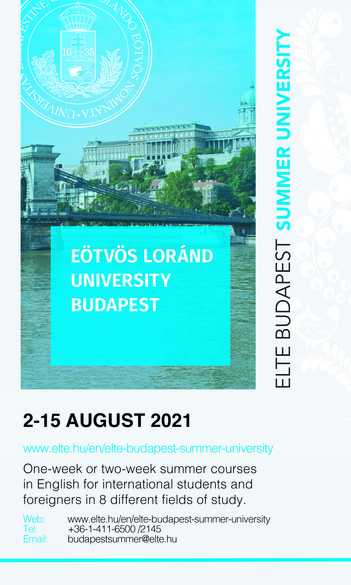Psychoanalysis, Art, Society and Culture in Hungary – The Budapest School of Psychoanalysis

When? 02 - 08. 08. 2021.
Where? ONLINE
By psychoanalysis, we do not mean just a psychotherapeutic approach; it is also a hermeneutic- phenomenological qualitative research method on human subjectivity, society, and culture. We invite students to delve into the mysteries of the unconscious and discover what the Hungarian and the Global Psychoanalysis could say about art, culture, and society.
The lectures of the Summer University will focus on the most fundamental psychoanalytic concepts and current theoretical constructs. The lecturers will introduce the basic concepts needed to properly understand a lecture, so applicants with limited immersion in psychoanalytical thought will follow the presentations.
Sándor Ferenczi (1873-1933) occupies an essential place in the curriculum of our Summer University. Ferenczi was Sigmund Freud's brilliant disciple and an innovative psychoanalyst. Ferenczi and other Hungarian psychoanalysts played an active role in Budapest's cultural life, and Budapest played ahi vital role in developing the Hungarian School of Psychoanalysis. Ferenczi is well-known for his essential role in propagating psychoanalytic ideas and contributing to psychoanalysis's understanding and global awareness.
Why is it important the Budapest School of Psychoanalysis? The Budapest or "Hungarian" School of Psychoanalysis denotes a trend of psychological ideas developed by psychoanalysts with strong ties to Hungary, Hungarian language, Hungarian culture, and Hungarian Jewish culture. Certain theorizations of the Budapest School were developed further in exile or emigration. Besides the "Ferenczi Phenomenon", many other psychoanalysts impacted the development of depth psychology. Imre Herman contributed with the "clinging instinct" theory, Michael Bálint's innovative thought on "basic fault" and his so-called "focal therapies" are important as well Balint's psychoanalytically informed case sharing group for medical doctors in which they discuss psychodynamic factors concerning patients. Géza Róheim also contributed to the development of ethnopsychoanalysis and Georges Devereux (née György Dobó,) on ethnopsychiatry. Franz Alexander (née Alexander Ferenc Gábor) laid down the fundaments of psychoanalytical psychosomatics. Ferenczi's theoretical work and methodological experiments marked the work of Melanie Klein (née Reizes Melánia), René Spitz (née Spitz Árpád René), Margaret Mahler's (née Schönberger Margit), David Rapaport's work is also rooted in the Budapest School's tradition. The Hungarian School catalyzed the development of psychoanalytical theory and techniques, and its theories were the starting point in the 1980s for the relational paradigm-shift, which philosophically is closely allied with social constructionism.
The Summer Universities' courses are open to all who are studying or graduated in human
or social sciences, psychology, and anyone interested in Psychoanalytic thought and re-reading from the perspective of current philosophical, social, artistic, and cultural perspectives.
Besides introducing the students to the various psychoanalysis theories, emphasizing the Budapest School of Psychoanalysis, as a part of our academic program we offer interactive programs, workshops too: the participants will have the opportunity to get insight into an art-therapy group experience.
Students can discover Ferenczi's cultural and professional connections in the frame of guided video-walks by visiting prominent places in Budapest related to his life and work – including his last residence in the elegant Buda side (Film).
The structure of the course is available on this link.
Back to ELTE Budapest Summer university 2021
E-mail: budapestsummer@elte.hu
Apply here
